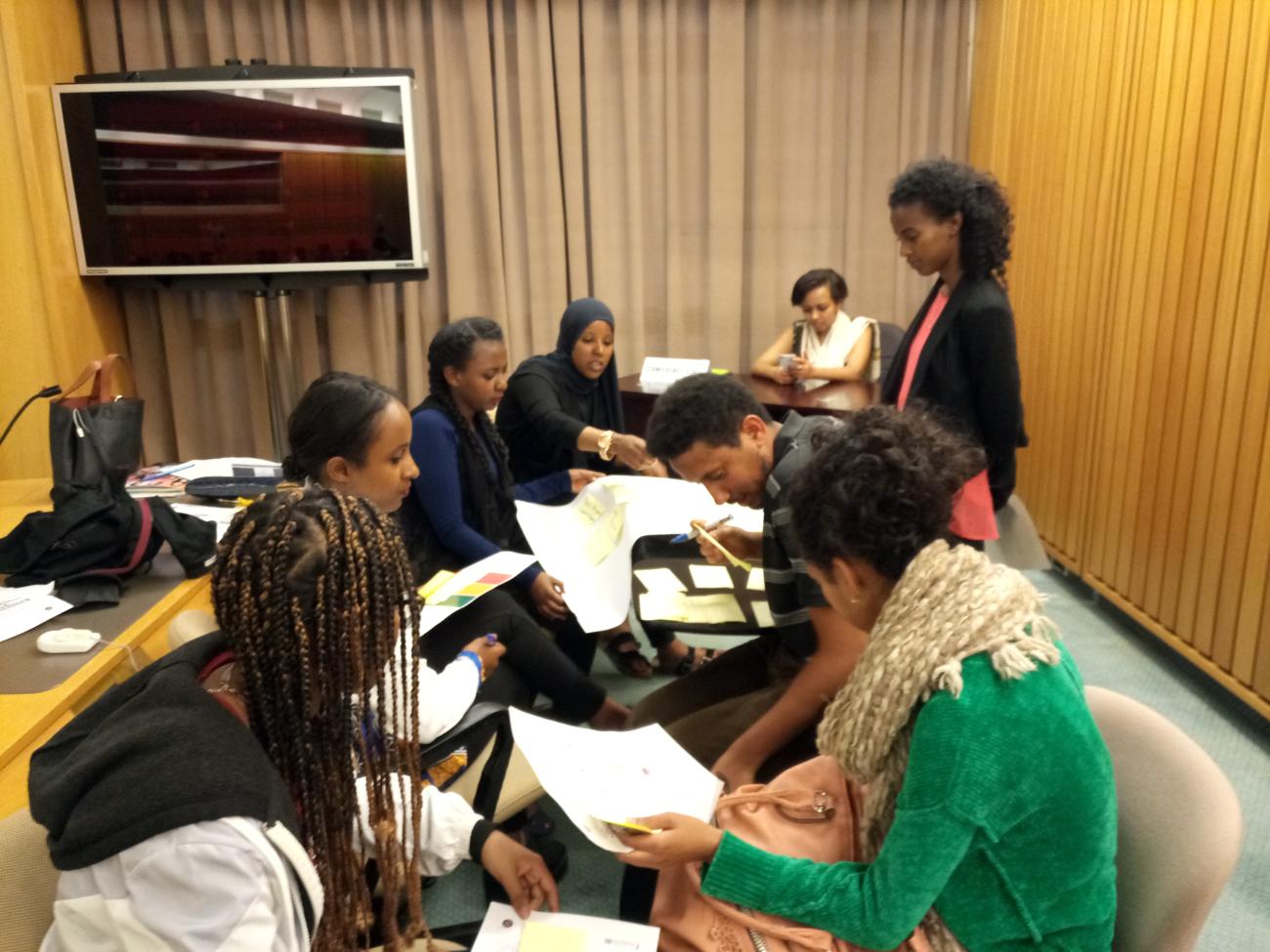The one-day forum was organized by the UN and the Ministry of Youth and Sport and brought together around 200 youth from various networks as well as local organisations that work on supporting youth to innovate, incubate and access entrepreneurship opportunities.
"It is critical to invest in young people and place them at the center of sustainable and inclusive development,” said Ms. Ahunna Eziakonwa-Onochie, UN Resident Coordinator, UNDP Resident Representative, and UN Humanitarian Coordinator in Ethiopia.
“Youth empowerment is at the heart of the 2030 Agenda for Sustainable Development. Young people have been very much engaged in the design of this agenda and it will be them as the leaders of the future who will see it through,” she added.
Presenting on global lessons around innovation, Minister Getahun Mekuria of the Ministry of Science and Technology stressed the need for youth to ensure that they incorporate technology when looking to launch their SMEs.
During the day’s discussion youth highlighted areas of opportunities and challenges in ensuring a creative space for engagement including the need to introduce more youth friendly financing and taxation systems; making agriculture more attractive to the young generation; providing support and space for young innovators to flourish; and exploring ways to integrate centres for youth with ongoing expansions in investments around industrial parks.
State Minister of Youth and Sport, Habiba Siraj, also expressed the commitment of the Ethiopian Government. The Government has formulated and embarked the youth development package that emanates from the national youth policy to address challenges facing the youth. “We cannot move a single step forward in every sphere of our national development without the participation of the youth,” she said.
The forum links to the African Union declaration of 2017 as the year of “Harnessing the Demographic Dividend through Investments in the Youth.”
Knowledge Café is an interactive mechanism used primarily to understand or confirm an understanding of themes and patterns of collective thoughts and opinions amongst a group of individuals. Knowledge Café involves three thematic areas: knowledge, startups and youth spaces.
Participants came from different socio- economic, educational and geographical locations and backgrounds. Gender parity was also taken into account when selecting participants.
Format
- A harvester sat in each table.
- Harvesters job facilitated the conversation in each table, instigate participants without guiding them or trying to shape their opinion.
- Harvesters were also responsible for collecting feedback from participants in their tables and later group similar feedback together. This happened in collaboration with the facilitator.
- Harvesters were from the youth board.
- Facilitator posed the first question to all participants, explained what it means and announced the time allotted for the discussion about that specific question
- Participants discussed amongst their groups and post their thoughts, opinions on the post it notes. They were encouraged to scribble, write or draw on the posters as well to freely externalize their thoughts
- Facilitator announced it when the time for the question is up. At this point harvesters ensured all feedback was captured.
- One representative from each group briefed the room on the outcome of the discussion on their particular table
- Participants then moved to other tables and sat with different participants (that they haven’t worked with in the previous question) harvesters stayed in their assigned tables
- Question 2 was posed and the process repeated
- At the end of all 4 questions, harvesters collected feedback on each question from all participants and worked with the facilitator to group similar feedback in one area noting all patterns and themes emerging from grouping feedback
- A one page summary of the findings was compiled and one or two of the participants presented that to the wider audience
Partners
blueMoon is an initiative that discovers, nurtures, and funds exceptional agribusiness ideas among youth that are innovative, scalable, and have huge transformational potential.
The Entrepreneurship Development Centre identifies growth-oriented enterprises as well as potential entrepreneurs, unemployed youth and women nationwide and provides them with training and business advice so that they establish and operate pro table, competitive businesses on a sustainable basis.
ICEAddis works on youth-driven private sector initiatives and facilitates constructive interaction between techies, entrepreneurs, investors and people from the creative industries.
xHub is an incubation center for social entrepreneurship that provides young entrepreneurs with logistical assistance such as internet access and working space but mentorship from various professionals as they develop their ideas into businesses or products.
Impact Hub Khartoum is part of Impact Hub global network, which has presence in 104 cities around the world. As a member of this massive global network, IHK has access to knowledge assets on a very wide range of topics including setting up and hosting spaces, startup incubation, scaling and acceleration as well as knowledge management.The forum links to the African Union declaration of 2017 as the year of “Harnessing the Demographic Dividend through Investments in the Youth.”




